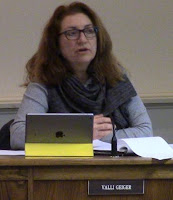Gulf of Maine water warming: bigger danger to lobster larvae than ocean acidification?
On November 23, 2015 at an Ocean Acidification gathering of scientists, NGOs and state and municipal officials, held in Augusta Maine, meeting co-host Susie Arnold of the Island Institute, read a several reports from researchers who couldn't attend that day.
 Among them, a report by Jes Waller a UMaine marine biology graduate student . Waller compared the effects on maine lobsters of increased acidification of seawater with the effects of increased tsewater tempersure. Here's the report read by Susie Arnold
Among them, a report by Jes Waller a UMaine marine biology graduate student . Waller compared the effects on maine lobsters of increased acidification of seawater with the effects of increased tsewater tempersure. Here's the report read by Susie Arnold
The word from Bigelow Lab: Lobster larvae may be affected more by ocean warming than by ocean acidification. Jes Waller, a UMaine grad student doing her research at Bigelow, compared the impacts of water warming and acidication on larval lobsters in the lab.
This according to an update from her that was read out to the participants at the recent ocean acidification meeting in Augusta.
Listen to that reading a 2min 37sec mp3
Waller extrapolated environmental conditions out to the year 2100, apparently by increasing the amount of acid-forming carbon dioxide in some of the larvae's environment to 750ppm, and increasing water temperature to 66 degrees in others.
Findings:
(1) Boosted acidification DID NOT appear to affect the lobster larvae's metabolism nor their behavior.
(2) Elevated water temperature DID affect them.Their respiration sped up, their motions increased , and their development through life stages sped up. (They have 3 larval stages, and one postlarval stage before becoming juvenile then adult lobsters.)
Waller's paper will be published soon, but it suggests that what appears to prove lethal to these superhungry larvae is that the amount of dissolved oxygen in the water and abundance of their tiny prey doesn't increase along with their needs. Not enough for their increased respiratory and food demands So they strangle and starve.
A legislator raised the question: does elevated acidity have impacts on lobster larvae's prey?

No one
knew. Food for the little ones include animals like water fleas , zooplankton copepods, crustacean larvae, eggs of about any fish or shellfish; and on the salad side: diatoms, dinoflagellates & filamentous algae.
Which of those are acid-sensitive and which are warming sensitive - and which are both?












